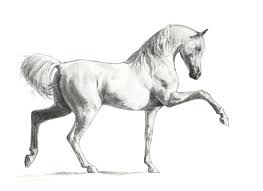prance
英 [prɑːns]
美 [præns]
- n. 昂首阔步;(马)后足立地腾跃
- vi. 腾跃;昂首阔步;欢跃
- vt. 使腾跃
- n. (Prance)人名;(英)普兰斯
星级词汇:

记忆方法
1. par- "intensify prefix" + avance (Old French formation of advance which is from ad- + ante "before, in front of") => paravance => prance.
2. 表示一种加强了含义的向前走、向前进。
2. 表示一种加强了含义的向前走、向前进。
中文词源
prance 阔步行走
来自中古英语pranken,昂首阔步走,词源同prank.
英语词源
- prance (v.)
- late 14c., originally of horses, of unknown origin, perhaps related to Middle English pranken "to show off," from Middle Dutch pronken "to strut, parade" (see prank); or perhaps from Danish dialectal prandse "to go in a stately manner." Klein suggests Old French paravancier. Related: Pranced; prancing. As a noun from 1751, from the verb.
权威例句
- 1. Aunt Jennifer's tigers prance across a screen.
- 珍妮弗阿姨的老虎们腾跃屏风.
- 2. So the horse, rather shabby, stood in an arrested prance in the boy's bedroom.
- 因此,这一破旧不堪的木马, 以固定的腾跃姿态立在保罗的卧室里.
- 3. A real man didn't prance around and yap at the mouth and preen for the camera.
- 显然生活中的人不会在摄影机前跃马而起,厉声喝斥,刻意打扮.
- 4. But when I'm thinking about war, I don't want to prance around the Maypole.
- 但是当我想到战争时, 我可不想围绕着五朔节花柱扎扎跳.
- 5. Whether may or not to use prance the message TT browser browse QQ space?
- 可不可以用腾讯的TT浏览器浏览QQ空间?
